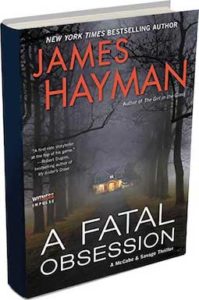Choose Your Hero Carefully. (It’s Kind of Like Getting Married.)
I decided to write my first novel in January of 2006. I had no idea what I was getting into. Not a clue.
Yes, I’d been a writer all my life. I wrote TV commercials for a living for more than twenty-five years. And when I left the agency business to become a freelancer, I wrote brochures, byline articles, annual reports and white papers for clients mostly in the financial services and healthcare industries. I even wrote two non-fiction books. Big glossy corporate histories written under contract to corporate clients.
But never any fiction. Not even a single completed short story let alone a three-hundred page novel. But it was something I’d always wanted to try, I wasn’t getting any younger, and as Rabbi Hillel famously asked, “If not now, when?”
But where to begin? What kind of novel wasn’t much of an issue. I was and am a fan of thrillers. Michael Connelly, Ian Rankin, Tess Gerritsen, Dennis Lahane, and Laura Lippman are all among my favorites. I wanted to write the kind of book I liked to read.
Choosing a setting wasn’t a big issue either. I’d moved to Portland, Maine a few years earlier and was convinced Portland would make a great location for a series. For reasons why, check out my blog post below titled “What Came First
A much tougher question, if this was to be the first book in a series, was creating a hero I could live with for a long time.
It seemed like it every possible variation on the thriller hero had been done over and over again.
The hero as superman has been done and done and done from Ian Fleming’s James Bond back in the 60’s to Lee Child’s hugely successful and on-going Jack Reacher series.
Ethnic diversity also abounds. Consider Alex McCall-Smith’s Mma Ramotswe from Botswana’s No. 1 Ladies Detective Agency and Tony Hillerman’s Navajo Indian detectives Jim Chee and Joe Leaphorn.
Examples of interesting professions or unusual skills? No problem. Dick Francis’s ex-jockey turned private eye, John Dunning’s rare book expert in the Bookman series and, probably the biggest money-maker of all time, Dan Brown’s Harvard Symbolologist, Robert Langdon.
Handicapped detectives seemed to represent an entire sub-genre. Suzanne Barnhill notes in her piece The Perfect Detective Novel, “There are blind detectives (such as Ernest Bramah’s Max Carrados), deaf detectives (Jack Livingston’s Joe Binney, Ellery Queen’s Drury Lane, and Dwight Steward’s Sampson Terhune), and lame or handicapped detectives (M. K. Shuman’s Micah Dunn and John Lutz’s Fred Carver)” Of course, we’re all familiar with Raymond Burr’s wheelchair-bound Ironsides. And a writer named George C. Chesbro has even written a series featuring a dwarf detective who is also a professor of criminology.
There may be even more clergymen and women out there solving fictional crimes than handicapped people. A list compiled by reference librarian Beth Radcliffe includes eleven nuns as sleuths and eight series featuring priests (most famously G.K. Chesterton’s Father Brown and Ralph McInerny’s more recent Father Dowling). Jews are less well represented, though Harry Kemelman’s Rabbi series (Friday the Rabbi Slept Late et al) was hugely successful. As for the Protestants,there are quite a few of those too. The one I’m most familiar with (and personally enjoy) is my fellow Mainer Julia Spencer-Fleming’s Rev. Claire Fergusson who is both an Episcopal priest and a US Army helicopter pilot (I believe Claire’s currently back in the pilot’s seat in Iraq, her National Guard unit having been called up.)
It seemed the only thing left for me was to create a series featuring trans-gender Siberian piano-tuner with a passion for raising parakeets. And, for all I knew, that had probably been done as well.
But the more I thought about it the more I realized it didn’t matter.
The heroes I liked best I liked not because of their peculiarities or deformities. They were simply flawed human beings like the rest of us. They solved murders because it was their job as cops. They were people we could all identify with. Yes, they each have a few individual quirks. Everyone does. Michael Connelly’s Harry Bosch is the orphaned son of a prostitute and his first name is Hieronymus. Ian Rankin’s John Rebus is an anti-social alcoholic. And Tess Gerritsen’s Jane Rizzoli has deep insecurities, anger management issues and major problems with both her mother and her insensitive lout of a brother. But they are all cops and, more importantly, they are all real people.
And so Michael McCabe, the hero of The Cutting, was born. Like all good characters, McCabe has a few idiosyncrasies of his own. He studied to be a film-maker and has an encyclopedic knowledge of old movies. He has an eidetic memory and can remember verbatim virtually everything he ever read or heard. But most important he’s a real human being, a good guy cop with plenty of problems and flaws. He’s a single father struggling to raise a teenage daughter on his own. He drinks too much. He has a hang-up about his ex-wife Sandy and still dreams about her. And he thinks he can solve every crime all by himself with little or no help from anyone else. As McCabe’s partner Maggie tells him in The Cutting, “Shit, McCabe, you always think you can do everything alone. And you call Kane a risk-taker. Even the Lone Ranger never went anywhere without Tonto.”
If you intend to write a series think very hard about who you want your hero to be. It’s the single most important decision you’ll make. And if you’re successful you’ll have to live with him or her for a long long time.


January 21st, 2010 at 11:01 am
Thanks Charles. look forward to reading your comments.